|
I feel like the word ‘habit’ generally has a negative connotation nowadays. We say things like ‘I need to kick that habit’, or ‘You need to get out of the habit of…’. But habits are just natural human ways of creating routines and sticking to them. We figure out what works for us, and if it does, then we repeat it. And if we repeat it enough, then it becomes a habit. Why else do we brush our teeth every morning and evening? It’s one of the most boring things in the world, and ok, ok, it’s “good for us”. But is that enough of a motivation to get me to go on a 5k run every day? No, no it is not. We get in the habit of brushing our teeth because we do it twice a day, and this in turn reinforces the habit. Our capacity to create long-lasting, ingrained habits is not something we should be trying to ‘kick’ or ‘get out of’. According to the Dalai Lama, it’s a useful tool for becoming happier. Ever tried the 30 day exercise challenge app? I have, multiple times. And I’m pretty sure I always get to around day 18 and then give up. But the reason it’s a 30 day challenge is that science has shown that to be the amount of time we take to develop a new habit. So if we stick with something for 30 days, it becomes lodged in our routine. So we’re on day 20 of the Happiness x Music Project - 10 more and we can hopefully make happiness a habit! "He said “All you're really given is the sunshine and your name”. We both started laughin' when the sky started to rain”
I know we only just had a Kenny Chesney song recently, but ‘Get Along’ is one of my all time favourites, because it’s just so full of positivity and energy, so I had to find a way to include it. Kenny Chesney also pokes fun at himself in the above line, and I always love a song that has a great message, but that doesn’t take itself too seriously. “Paint a wall, learn to dance Call your mom, buy a boat Drink a beer, sing a song Make a friend, can't we all get along” In the chorus, he makes a list of habits we can get into, and the way he reels them off makes it seem like he’s trying to ingrain them each time you listen to the song. I also find it inspiring especially during this time of lockdown, because we do have the opportunity to try new things and build new healthy habits. Although I’m not sure how much good buying a boat would do, given we’re all stuck inside… “Get along while we can Always give love the upper hand” He caps off his list with an uplifting message of unity, which is what the song is ultimately all about. Just have compassion for those around you, and be loving towards them. “Scared to live, scared to die We ain't perfect but we try” This is one of the best lines in the song, in my view, because it epitomises the anxiety we can feel about trying to do things perfectly. With a lot of Self-Help books, it can feel like there’s one ‘right way’ that we all should take in order to be happy. But everyone is unique, and everyone needs to focus on different things. While this project sets out the Dalai Lama’s key teachings about how to be happy, it doesn’t mean there’s a one-size-fits-all model for happiness. We’re all individuals with different worries, problems and goals. Some of us might need to focus more on being selfless and putting others first, while others might need to direct more energy into improving our self-image. The Buddha has thousands of teachings ascribed to him, and many of them seem to contradict each other. But it is important to remember that he is portrayed as a doctor, and a doctor treats each patient according to their own individual needs. If someone turns up with breathing difficulties, a good doctor wouldn’t prescribe the same treatment as he would for someone with a broken leg. In the same way, while all the teachings are ultimately beneficial, it is up to you to decide which ones you feel you need to give more attention to. This can then guide you in choosing which new habits you want to try and cultivate. Maxim Mower
0 Comments
This is definitely a difficult one, because when there are people we don’t like, we usually have a reason for not liking them. As a result, it can be hard to see past that reason and adopt a more patient and tolerant attitude towards our enemies. But I think this teaching is tied into the acceptance of our own faults (Song 16), as well as the idea of being compassionate to others (Song 4). If we can embrace our own flaws, then I think it’s much easier to embrace other people’s flaws. We have seen how suffering is something that’s universal, and if we employ empathy (Song 9), then we can step into the shoes of our enemy and see that they might only be acting as they are because of a personal struggle they’re going through. There are lots of references in Buddhism to forgiveness. It is important, for our own mental clarity and peace, to forgive others for their wrong actions. This is a really thorny issue, and I still personally feel like some things are simply too awful to forgive. But there’s a great quote from the Dalai Lama that says: “Practicing forgiveness does not mean accepting wrongdoing” I think this makes it easier to accept this principle of tolerance, because it is not entailing that we sanction the person's wrongdoing. Instead it is about letting go of that reason we have to view that person as our enemy - not for their sake, but for our sake, because it will lead to a healthier state of mind if we can let it go. Once we forgive our enemies, according to the Dalai Lama, we can then see any instances where they might frustrate us or antagonise us as opportunities to practice patience and tolerance. This seems like a crazy way of thinking, because to see our enemies in this way is to be thankful that they are there, so that we can practice these virtues. Was Luke Skywalker really thankful for Darth Vader’s presence? I bet Tony Stark wasn’t too grateful to have Thanos as his enemy… But while it might sound ludicrous, it is undoubtedly a great way to move an otherwise negative situation into a positive light. Also, if we stop viewing these people as our enemies, then it will be easier to maintain a universal feeling of compassion. “And the haters gonna hate, hate, hate, hate, hate
Baby, I'm just gonna shake, shake, shake, shake, shake I shake it off, I shake it off” Today’s song is clearly going to require a very in-depth analysis into the layers of meaning, subtly laced into the fabric of the repeated lyrics… I’m kidding of course! This is a straightforward, guilty-pleasure song about brushing off your haters and staying true to yourself. There are some meditative techniques that literally involve shaking your hands by your side, and imagining you are shaking off negative energy. Is Taylor Swift a guided meditator in disguise…? “But I keep cruisin' Can't stop, won't stop movin' It's like I got this music in my mind Saying it's gonna be alright” It’s a great song, because it’s all about positive energy, and not letting any negativity from outside sources drag you down. I recently saw this really good quote, taken from Deepak Chopra’s book, Metahuman: “It took me a while to see that my critics were my teachers constantly reminding me of my addiction to approval. Today I’m grateful for their presence in my life. They taught me the meaning of freedom” This links to the Dalai Lama’s idea about being grateful for our enemies, because they offer us opportunities to become better and happier people. I love this Deepak Chopra quote, and I know that I personally hate the feeling of being criticised, especially if you think you’ve done a good job of something. “I stay out too late Got nothing in my brain That's what people say, mmm, mmm” But it’s true that this is only because I care too much about what other people think of me. And like Chopra says, having critics is a great way to have this constant reminder that I do over-stress about what other people think, and that I should instead not act with the intention of gaining approval, because this is never going to be something in my control, anyway. “I never miss a beat I'm lightning on my feet And that's what they don’t see” Taylor Swift switches from talking about what other people say about her, to proudly stating what she’s actually like, and this is the kind of positivity that the Dalai Lama is trying to instil through his teaching. We should be proud of who we are, regardless of what other people think. And the negativity coming from our haters or enemies? Well, in the wise words of Taylor Swift - just shake it off. Maxim Mower I’ve mentioned perspective quite a lot over the course of this project, and this is because it’s possibly the most crucial part of everything we do. There’s nothing we can experience in life that isn’t influenced by our perspective, simply because our perception of the world is through a first-person lens. Everything, as a result, is subjective. Perspective pervades everything - even something as trivial as two people sat at a table outside. They will both see the table differently, because the sunlight will be reflecting off different parts of it. This will make the table appear to have a patch of white on it, but in different spots, depending on which angle they look at it from. It might therefore seem like ‘perspective’ is an inescapable burden we’re lumbered with, and this can definitely be true in the case of disagreements, where people are too attached to their own personal views. But our perspective is also a great tool if we can learn to use it right, according to the Dalai Lama. As touched upon previously, even though it is usually the result of external conditions, suffering is always experienced in the mind. Which means the more control we can have over our mind, and over our perspective, the more control we can have over our suffering. There is always another way to look at a situation. Unfortunately for readers, there’s another golf analogy on the way…but I think it paints the picture pretty well. You hit an amazing shot, and it’s heading straight for the green, but it just catches a branch from a nearby tree. As a result, instead of being 200 yards ahead and right next to the pin, your ball drops about twenty yards in front of you. My instinct, and I think just about every golfer on the planet’s instinct (unless the Dalai Lama has a secret penchant for the game that no-one knows about), would be to moan in utter frustration. You couldn’t have done anything better with your swing, your execution, and the conditions were just right for a perfect shot. It was just the dumb tree. But there’s always another perspective. Instead of having an easy tap-in putt, you now have a chance to practice a longer shot, that will help you in future. It might be the more annoying route to getting your ball in the hole, but it might also be the one that you learn more from. Or take the example of being in lockdown. It's easy to complain and harbour feelings of resentment for being forced to stay inside. Alternatively, though, we could approach it with the perspective of this being a once-in-a-lifetime opportunity. We now have the time to do things we would usually be too busy to do, to read that book we always wanted to read, to listen to that album that everyone always tells you to listen to, to meditate, and so on. There’s no right or wrong perspective to have, and of course, it's difficult to flippantly say we should be grateful to be in lockdown, when there's people dying across the world because of the virus. That’s the whole point of our perspective being subjective, rather than objective. But there can definitely be ways of looking at the world which contribute to more positive, healthier states of mind. “Oh I've seen trouble more than any man should bear,
But I've seen enough joy, I've had more than my share” ‘Trouble’ epitomises this possibility to see situations from different angles. The singer outlines that they’ve experienced pain, and they could easily focus their attention on this and lament the fact that they’ve had to go through this. But instead, they inspiringly choose to acknowledge that they’ve also seen plenty of joy, changing the whole tone of the song. It always depends on what you choose to pay more attention to. “I've been a beggar and I've been a king, I’ve been a loner and I've worn the ring” This just adds more layers to the image that’s being constructed, stressing how it’s a matter of perspective whether you choose to focus on the negatives in life, or whether you opt for a more optimistic angle. “Never been last, but I've never been first. Oh I may not be the best, but I'm far from the worst” I think most people, myself included, would instinctively be more likely to say ‘I’ve never been first’, as opposed to ‘I’ve never been last’. The latter doesn’t really seem to be a huge accomplishment, especially given the often competitive nature of Western society. But in any contest, even if you didn't do all that well, why not celebrate the fact that you’ve didn't come last? In a race, it’s interesting how the person that comes third generally seems to be happier than the person that comes second. This is because the second person tends to feel like they've ‘lost out’ on first place, while the third person sees it as them ‘gaining’ a podium position. This teaching links back to one of the first posts in this project, about comparing your situation to those less fortunate, as opposed to being resentful of not having as much as those better off. The Dalai Lama tells us not to get too bogged down by our individual situation, but to see the bigger picture too. “The mind fears the heart, but the heart doesn't mind. Oh I may not be perfect, but I'm loving this life” Maxim Mower At the heart of Buddhist philosophy lies the observation that ‘change is the only constant’. It’s a truth that we can see on all levels of life, from the way a daffodil blooms in spring and then swiftly retreats into itself again for another year, to the perennial cycle of the Earth orbiting the Sun. Nothing stands still. There’s enough evidence in the world to underline this fact of universal impermanence. Having said this, we can still hold out hope that some things are unchanging, such as love, and depending on your beliefs, God, and the soul perhaps. While there may well be a handful of constants, the transient nature of life means it’s inevitable that we’re going to be thrown curveballs. We just never know what the future might hold. Take COVID-19, for example. Who could’ve foreseen the world going into lockdown this time last year? Even on a less global scale, life is incredibly unpredictable. This can make it really tough, especially when it affects our relationships, and we have to deal with the turmoil that the loss of a loved one or a break-up might cause. If you like to plan ahead, the mercurial nature of the world can feel like a huge headache, and it can feel as though you’re not in control of your life. However, the unpredictability of life is also part of what makes it so beautiful. If everything always went exactly as we thought it would, then we would get bored pretty soon. Just think about all those movies where you can guess the entire plot, and think about how dull they are. By contrast, think of one of the truly great films - say, Anchorman, or Anchorman 2, perhaps - where there are twists and turns and you watch the entire thing not quite sure what’s going to happen. I mean who could’ve guessed the shark thing, right? Seriously though, my poor taste in films aside, while unpredictability is the cause of a lot of suffering, it also adds a lot of colour to our lives. The Dalai Lama makes the interesting point about relationships, and how a couple can panic if the passion isn’t as strong as it was at the start, or if the dynamic just changes over time, and they can often break up as a result. But any kind of relationship is always going to evolve, simply because it’s situated in this world where everything changes. And this isn’t necessarily a bad thing. Think of that Friends episode where Monica freaks out because Phoebe and her new boyfriend are all over each other, while her and Chandler aren’t anymore. But Chandler makes the really good point that where they are now in their relationship is, in a way, more exciting, because it’s getting deeper and more meaningful. As usual, it’s all about perspective. During lockdown, I’ve really fallen in love with Kenny Chesney’s music, mainly because it’s so laid-back and summery. It’s usually just a simple, mellow guitar wrapped around a ‘carpe-diem’ cri-de-coeur, and in times like these where there’s a lot of uncertainty flying around, it’s really relaxing to listen to his melodies about making the most of the here and now.
“I ain't lonely, but I spend a lot of time alone, more than I'd like to, but I’m okay with staying home.” ‘Better Boat’ is one of my favourites, and I think it’s perfect for today’s teaching. It almost feels as if he wrote it directly about the world of quarantine and self-isolation that we’re experiencing, but the song was released back in 2018, and it’s a cover of Travis Meadows’ 2017 track of the same name. “My how the last few months have changed, I’m smiling more despite the pain” ‘My how the last few months have changed’ - I mean, yeah, you could say that again, Kenny! But for me it’s inspiring how he contrasts this feeling of shock at how everything has turned upside down, with the peaceful defiance of ‘I’m smiling more despite the pain’. “I breathe in, I breathe out. Got friends to call who let me talk about, what ain't working, what’s still hurting, all the things I feel like cussing out” This song is ideal for meditation, because it starts by taking a moment, as you do when meditating, to just focus on your breath. He then goes into another very poignant line for modern times, by singing about how we’re having to rely heavily on calling friends and unloading our worries about the global situation. “Now and then I let it go, I ride the waves I can't control, I’m learning how to build a better boat” This is the key line for today’s principle of embracing change, and I think it’s a really beautiful analogy. The significance of the changes we experience will inevitably vary depending on what it is that’s changing - take your favourite magazine using a new font versus your beloved dog becoming ill, for example. Unless you have a secret Garamond fetish, the latter is always going to mean more. So I think the analogy of change coming in waves is really apt, because often it won’t be too impactful, but every now and then a really big one will just come and smack you right in the face, leaving you momentarily feeling lost. Also, people suffering from anxiety often talk about the feeling of worry coming in waves. We can’t change the fact that the waves are there (unless you’re Moses, I guess). But we can try and alter how we react to them. The metaphor of building a better boat that is more resilient to what’s being thrown at it symbolises how we can train our mind to cope with change more effectively, through accepting that we can’t control the waves. “I think I'm stronger than I was, I let God do what He does” Again, there’s this overwhelming sense of acceptance that has been a vital theme in the past couple of posts. If we accept what is outside of our control, then that rules out a lot of things that we would normally worry about. There’s nothing we can do about them, so just ride the waves, build as strong a boat as possible, and sail off into the sunset with an ice cold beer and a Kenny Chesney song. Maxim Mower Yesterday’s post was all about being honest with yourself and owning up to your mistakes. However, if we were to always look at our actions with a critical eye, then we would develop an incredibly negative self-image, because our focus would mainly be on the things we were doing wrong. Obviously this is not a beneficial attitude to adopt 24/7. We have to find a balance between looking for our contribution to problems, whilst at the same time not judging ourselves. This teaching handles the latter. The Dalai Lama outlines that we must accept out faults and regrets, highlighting again the importance of acceptance in creating happy states of mind. Yet in doing so, we must be careful not to indulge in our flaws and pay too much attention to them, because this will only damage our self-esteem. While acceptance is a pervasive mentality in the Buddhist path, non-judgment is equally as prominent. When meditating, teachers always stress how you shouldn’t put pressure on yourself to achieve anything specific during the session, because this will only lead to frustration if you don’t meet your expectations. We are only human, and we are going to make mistakes and fall short of the standards that society might set for us, or that we might set for ourselves. But it is crucial in alleviating this pressure to understand that these are completely constructed and artificial standards, and they are not as important as they might seem. In this period of lockdown, there is a lot of talk online about how we should optimise this time by learning a new language, writing a novel, etc. But I saw a really good tweet by JK Rowling dismissing this pressure to be productive, saying how it is far more important to look after our mental health and not expect so much of ourselves. Singer Jhené Aiko put up this really insightful Instagram post, underlining how productivity isn’t the most valuable thing in life, even though it can often feel like it is, particularly during periods like these where we have a lot of time on our hands. I chose Jess Glynne’s ‘Don’t Be So Hard on Yourself’ for today’s teaching, because it sends a very liberating message of taking the weight off your shoulders, and easing the strain you put on yourself to always meet other people’s expectations.
“I came here with a broken heart that no one else could see, I drew a smile on my face to paper over me” She begins the song by saying how she used to mask her problems to the outside world, but the metaphor of ‘papering over’ the cracks makes it clear that this was a very flimsy, unsustainable way of dealing with her troubles. “Don't be so hard on yourself, no, learn to forgive, learn to let go” It’s also interesting that she mentions forgiveness, because usually this is something associated with how we treat other people. But it’s just as important to forgive yourself for the slip-ups and false starts, otherwise you’ll constantly feel as though you’re underachieving and failing. “I'm standing on top of the world, right where I wanna be, so how can this dark cloud keep raining over me? But hearts break and hell's a place that everyone knows” In an interview, Jess Glynne mentioned how she wrote this line when she’d just signed a record deal, but was struggling with personal issues off the back of a bad break-up. To the outside world, it looked like it should have been one of the high points of her life, but inside she was feeling pretty low. “I learned to wave goodbye, how not to see my life through someone else's eyes” As the song reaches its climax, she realises that it really doesn’t matter how other people are expecting you to feel, or how you think you ‘should’ feel. That’s completely irrelevant, because there’s no right or wrong way to feel in any given situation - you feel what you feel. And that’s part of the beauty of life, that we all see things slightly differently, from our own, unique perspectives. “Everyone trips, everyone falls, so don't be so hard on yourself, no” Maxim Mower I feel like this is a really important one, because it can be so tempting to blame someone else at times when deep down you know you were at fault. There’s a big emphasis in Western society on rising through the ranks, getting that next promotion, which means we can get that new car, which means our status will go up, and so on… This drive that becomes engrained in us isn’t necessarily a bad thing, but it does engender a very competitive mindset. If you want the promotion, but everyone else on your team is also gunning for it, then you’re inevitably pitted against each other. The trouble with this is it means that when things go wrong, we’re much less likely to want to accept ownership for the mistake, because it makes us appear weaker than our colleagues, friends, family, etc. - whoever it is that we’re looking to impress. I think once we remove any sense of ego, then it’s a lot easier to be willing to hold your hands up and say, ‘Okay, I dropped the ball. But I’ll do better next time’. Because if we’re not willing to accept that we’ve made a mistake, then how can we possible learn from that mistake so that we don’t make it again? Nobody likes to mess up, and trust me, whenever I was playing on a football or cricket team, it was my worst nightmare to make a mistake. So if there was a way out through covering up and pretending I hadn’t made that mistake, then I would take that way out hands down. But, as you can imagine, eventually you’re going to get found out. I keep linking specific teachings to ones that have already been covered, and this is because they’re all interwoven, and some of them you can’t accomplish without having already learnt a previous lesson. This idea of accepting your contribution to a problem is tied in with the teaching of compassion, because if you’re cultivating a truly loving and compassionate attitude towards others, then you wouldn’t ever be willing to blame someone for something you did wrong. It’s also linked with the teaching of acceptance, because it involves accepting ownership of your mistake. Equally, if you adhere to the teaching of treating human nature as compassionate, then you’ll be more trusting of others, and you won’t fear that there might be judgment or a negative reaction to you admitting that you made a mistake. “When I dance alone, and the sun's bleeding down, blame it on me”
Today’s song is ‘Blame it On Me’ by George Ezra, and from the title alone it’s clear I haven’t gone for subtlety with this one! “When I lose control and the veil's overused, blame it on me” Ezra rattles through various cryptic ways that he messes up in some shape or form, but he punctuates each one by saying ‘blame it on me’. When I listen to it, the repetition of this acts as a kind of mantra in my head, and reaffirms the idea of taking ownership of our mistakes as Ezra is doing. “We counted all our reasons, excuses that we made, we found ourselves some treasure, and threw it all away” Here he sings about how he has been making excuses and trying to justify why he did what he did, being stuck in the mindset of not acknowledging the mistake. But in saying that he found treasure and threw it all away, it clearly signifies his about-turn, as he begins to realise that he can only blame himself. “What’re you waiting for? What’re you waiting for?” I think a middle way approach is important in practising this teaching, though, because we don’t want to swing too far in the opposite direction and start being overly critical of ourselves. While we should, according to the Dalai Lama, take blame where blame is due, it’s just as important to take credit where credit is due too. This leads nicely onto tomorrow’s teaching…any guesses? Maxim Mower I feel like this is a tricky one, because we all know it’s true deep down. But rationalising it like this doesn’t help the pain of losing a loved one. I said in a previous post how I’ve always been terrified of those closest to me dying. Today’s teaching definitely feels a bit cold. Also, taking time to grieve is, in many cultures, a really important process not only for those left on Earth, but for the deceased’s passage into an afterlife. For example, I conducted extensive research into Mexico’s Day of the Dead holiday (okay I lied, I just watched Disney’s Coco). But the main premise in that film was the idea that the souls of those who have died reside in an afterlife, but only for as long as there is someone on Earth remembering them. Once they’re forgotten, the soul disappears. So I’m not sure people believing in this tradition would be too keen to just accept the loss and move on from it asap. But this teaching is a lot clearer and warmer when situated in the Dalai Lama’s longer answer to Cutler’s question on dealing with loss. He first says that he can take comfort in his belief that the loved one will be reborn, but he acknowledges that not everyone believes in life after death. He says that feelings of grief and anxiety in response to loss are completely natural, and that when he lost his tutor, his mother and one of his brothers, he couldn’t help but feel extremely sad. His advice regarding the idea that worrying won’t help the deceased is given only in the context of someone being overwhelmed by sorrow and loss for months on end, where the suffering is starting to stop you from being able to live your life. This is when he says it might be helpful to reflect on the idea that the loved one would surely not want you to be in this much pain, and it will not benefit them in any way to hold onto this suffering. But what about holding onto their memory? Isn’t this something we should of course do, but something we cannot do without also feeling the pain of their absence? The Dalai Lama draws on his own grief to formulate a very pragmatic, but also compassionate, answer to this question: “When they passed away, of course, I felt very, very sad. Then I constantly kept thinking that it’s no use to worry too much, and if I really loved these people, then I must fulfil their wishes with a calm mind. So I try my best to do that. So I think if you’ve lost someone who is very dear to you, that’s the proper way to approach it. You see, the best way to keep a memory of that person, the best remembrance, is to see if you can carry on the wishes of that person.” I feel like grief is such a difficult thing to just prescribe one way of dealing with it, but if it’s eating you up, this does seem like a good way of easing your pain a little. However, I think it’s important not to mistake the Dalai Lama as saying we should just rationalise our grief and push it down within us. Cutler recalls a particular psychiatry patient (if it wasn’t already clear, I love alliteration…) who had suffered the loss of his father. Everyone remarked how stoically he seemed to handle it, but a year on he spiralled into severe depression. According to Cutler, this was because he hadn’t properly confronted his feelings of grief and loss, instead trying to rationalise them and ‘be strong’ for his family. Soon after fully facing and experiencing the grief that he’d bottled up, his depression lifted quite quickly. This clearly ties in with yesterday’s post on confronting your problems, and being open about them. So while the Dalai Lama’s lesson about grief is really useful in easing the pain of loss, Cutler’s anecdote shows that it’s still crucial to be honest with yourself about your feelings, and not try and suppress them. “Dad always told me, “Don't you cry when you're down”. But mum, there's a tear every time that I blink”
Again, there were plenty of songs to choose from for this teaching, but I went with ‘Supermarket Flowers’ by Ed Sheeran. It’s an incredibly moving piece of music, and I find it difficult to listen to without tearing up (admittedly it doesn’t take much), but the chorus is also uplifting in a bittersweet kind of way. “Oh, I'm in pieces, it's tearing me up, but I know a heart that's broke is a heart that's been loved” I think this sums up the perfect balance between the Dalai Lama’s rational approach and Cutler’s emphasis on the need for outwardly releasing our grief. Sheeran expresses his pain in a way that it’s clear he’s not holding anything back, but he still manages to find solace in the knowledge that him and his mother shared a lot of loving memories, and that these will always live on no matter what. “Spread your wings as you go, when God takes you back, He’ll say, "Hallelujah, you're home”” At the beginning of the chapter that covers grief in The Art of Happiness, there’s a very poignant Buddhist tale about a woman whose child is dying of an illness, and she goes to the Buddha asking for an antidote. He replies that he can make one, but he needs her to get a handful of mustard seeds. She lights up, thinking this will be easy, but the Buddha adds the caveat that the seeds must be obtained from a household where no spouse, parent, child or servant has died. Of course, she can find no such household, and for me this links back to one of the earlier teachings included in this project, that of the common ground between all human beings. We all have to face suffering, but death in particular is something that everyone has to face. This is a scary prospect, and I am still trying to overcome my own fear of it. But at the same time, it’s also comforting to know that we’re all in this together. Maxim Mower This continues on nicely from yesterday’s post about preparing and training your mind for ‘battle’ with suffering. It feels a bit odd using so many war analogies to explain the peaceful, pacifist tradition of Buddhism…but hopefully it’s helping to make the points clearer. If you’re taking on an opponent, the more you know about who you’re going up against, the more likely you are to succeed. For example, if you’re duelling with someone where you know all their strengths and weaknesses, you’ll be able to formulate a much more effective strategy for overcoming them. By contrast, if you know nothing about them, then it’s literally a stab in the dark, and you’re much less likely to hit your target. It’s the same with tackling negative mental states, according to the Dalai Lama, and it’s better to look into your problems, as opposed to running from them. Personally, the last thing I want to do is actually think about any problems that might be playing on my mind - I’d much rather avoid them. But I think we all know from experience that if we attack them head on, and take the time to see what it actually is that’s causing us stress, then it makes everything seem so much clearer, and we generally feel better about the situation as a result. A lot of the time, it’s something that’s not as big a deal as it seemed, and reflecting on the issue and understanding why it’s disturbing your peace of mind can help in easing any pain it’s causing you. If we avoid it, then it’s still lingering there in the back of our mind, and we haven’t made any progress in solving the problem. “Alone in my room and the tears start pouring, wishing the night was still the morning. But tonight, imma let them fall down, fall down”
I feel like there are lots of songs that would suit this teaching, but I went with Mabel’s ‘OK (Anxiety Anthem)’. In it she confronts her anxiety, something that will be covered in more depth later on in this project. It’s a super inspiring ode to being open with yourself about your feelings, and accepting them without judgment. “‘Cause it's okay not to be okay, it’s okay if you feel the pain, don’t gotta wipe your tears away” This builds again on yesterday’s post, because it’s again centred around the idea of accepting the pain you feel, and not being ashamed about it. Because from this starting point the Dalai Lama says it’s so much easier to then tackle the pain from the root upwards and nip it in the bud. “So what do I do? Just wear it on my sleeve” I also love this song because it ends on a really uplifting note of optimism, which is especially important during times like these, where all the uncertainty and turmoil can make the whole COVID-19 situation feel a bit hopeless. Even though it might hurt more initially by confronting our problems head on, it’s worth it in the long-run, and it’ll no longer feel as though we’re bottling something up and having to hide how we’re feeling. That’s the theory at least, so let’s see if it works! “It's fine, you're allowed to break, as long as you know, as long as you know, everything’s gonna be okay” Maxim Mower Before coming to University, I really wanted to be a professional golfer. My coach said I had some natural talent, and I managed to get to a pretty good standard as a result of his lessons and going out on the course regularly with my dad. However, after a while of steady improvement, I hit a wall. I plateaued, and my handicap started yo-yoing. I asked my coach what was up, and he gave me a lesson and some good pieces of advice. But when I played out on the course with my dad later that week, I was still hitting every bush and tree in sight. When I went back to my coach, he asked me a question, one that made me realise what I’d been doing wrong all along. The question he asked when I complained to him was, “Well, have you been practising what I taught you?” And I hadn’t. Sure, I’d been going out on the course with my dad, but I hadn’t been going down to the Driving Range hitting bucket after bucket, like everyone else who genuinely wanted to be a pro golfer was doing. I wasn’t practising what my coach had said, which meant there was no way I was going to be able to actually implement it. Ok, ok, enough golf talk. The point of this story is to show exactly what the Dalai Lama is saying here about achieving happiness. The advice he’s giving, and the teachings that are contained in this project, are not quick fixes. There’s no nugget of information that you’ll read and it’ll be like a light-switch of happiness has just been turned on (although that would be such a cool invention). The brain is a muscle, so just like people who regularly go to the gym (myself not included) to work out physical muscles, it’s just as important to train our mental muscle. That’s why I’m hoping this playlist that we’re creating will be something we can keep coming back to in order to reinforce and remind ourselves of the key ideas. “Even when the sky comes falling down, I’ll be ready when the sky comes falling down”
‘When the Day Comes’ is all about this preparation, and it’s put in the metaphorical context of readying oneself for a war, but we can just imagine we’re going to war with negative states of mind (too much of a stretch?). “Today I will march for you, today I will march for me, we raise our arms and hope for better days” In all seriousness, the Dalai Lama explicitly makes the comparison to soldiers drilling for battle, saying that we must train the mind in the same way, so that it can handle any obstacles thrown its way. We’ll never be able to stop encountering some forms of suffering, even if we just stayed indoors forever and never ventured outside (something that we’ve all recently found out isn’t a lifestyle we want to continue any longer than we have to). But the actual experience of suffering happens in the mind, so even though we can’t change things like old age and death, we can change how we handle them, through training the mind in the field of happiness. Equally it’s interesting that Howard C. Cutler, a psychiatrist and the man interviewing the Dalai Lama in The Art of Happiness, says that neuroscience has proven that the brain can design new patterns and new combinations of nerve cells in response to our ways of thinking. In other words, our brains are malleable, which means we can adjust and alter their wiring through practising new, positive habits. It seems that practice really does, as my mum always tells me, make perfect. Well, maybe perfection is a bit of a lofty goal…but it can at least make us happier, and that’s not only an achievable aim, but one that we all have a right to reach. “Even when the day comes, I’ll be ready when the day comes” So raise those dumbbells of delight and hop on that tranquility treadmill - it’s workout time. Maxim Mower Wait. Hold up. ‘Accept that suffering is part of life’…but isn’t the whole point of Buddhism to remove suffering? This definitely sounds counter-intuitive at first, but after thinking about it for a while, it really does make sense. If we embrace the fact that suffering is inevitable, then it removes any kind of resentment or feeling of ‘why me?’ when things do cause us pain. The universality of suffering is yet another thing that bonds us humans together, because it’s something we all experience, one way or another. Furthermore, acknowledging that things aren’t always going to go your way makes it easier to move on from times when you fall down, because you accept that things didn’t work out, and that just means you can dust yourself off and keep going. Especially with the current COVID-19 pandemic, everyone’s having to make compromises and adjustments, and that’s caused a heck of a lot of upheaval and turmoil across the globe. But we’re all in it together, and I think if we approach this pandemic with the Dalai Lama’s mentality of acceptance, then we can see it not as a massive injustice against us, but rather as an opportunity to really come together (accidental Beatles reference) and help (whoops, another one) each other. Just let it be (ok, that one was on purpose). It might be easy to look at the Dalai Lama and say, ‘oh, but what does he really know about suffering?’. And it’s true that the life of a monk seems very peaceful and unperturbed. But the Dalai Lama has not by any means had an easy life. He was just 15 years old when China invaded Tibet in 1950, forcing him to assume political power despite only being a teenager. He was then exiled from Tibet in 1959 after leading a failed Tibetan uprising against Chinese occupation, and has since had to live with the knowledge that his people are being persecuted, and that there’s nothing he can do about it except campaign for change. So I think it’s safe to say he’s seen his fair share of struggle and suffering, which makes it even more inspiring that he can adopt this stance of acceptance. In The Art of Happiness he repeatedly references his attitude of forgiveness and compassion towards the people that exiled him and took control of his country, and outlines his hopes for a peaceful resolution. This brings us to another key aspect of this teaching - accepting that suffering is inevitable does not mean that we should simply resign ourselves to this pain and not try to change our situation. I think it is more about doing this without harbouring any feelings of resentment and fear, and this is where an attitude of acceptance can help us. There are lots of possible songs that would be relevant for this teaching. I was tempted to pick Kelly Clarkson’s ‘(Stronger) What Doesn’t Kill You’, Andra Day’s ‘Rise Up’, and numerous others. Saying ‘I get knocked down, but I get up again’ (hey that’s catchy…should I become a songwriter?) is clearly a very common theme in music, probably because it’s so relatable and, like I said earlier, universal. But I went for Coldplay’s ‘Up&Up’, and I think it fits the bill perfectly, because it’s all about finding yourself in difficult situations where it would be easy to give up. But instead of giving up, they turn around and say ‘we can do this.’
“We’re gonna get it, get it together right now, we’re gonna get it, get it together somehow” This links back to the very first teaching in this project, which was all about creating that heartfelt intention to be happy. The moments described in ‘Up&Up’ are all crossroads, where the character in the song has the choice between resigning themselves to their plight, or the route of trying to achieve happiness. “Lying in the gutter, aiming for the moon; trying to empty out the ocean with a spoon; up and up” The above scenarios are clearly hyperbolic, but they portray impossible tasks, where there would undoubtedly be a feeling of hopelessness in chasing such an unattainable aim. And hopelessness is a completely understandable response to suffering, especially when it feels relentless. But that’s what I love about the song, it flies in the face of what seems possible and just tells us to keep striving for our goal regardless. It’s all about perspective. “See the forest there in every seed, angels in the marble waiting to be freed; just need love, just need love” The story behind Gospel singer Merry Clayton’s appearance on the track also adds to the value of ‘Up&Up’, in showing us how to accept suffering so we can move on from it. Chris Martin describes how, when they asked her to be a part of their album, she had just had both her legs amputated at the knee, following a serious car accident. In an interview, Martin described her inspiring attitude, despite this suffering: “She came in a wheelchair and did her thing and then said, ‘I just lost my legs’. We didn’t know. She’d just come out of hospital the week before but was so full of joy, gratitude, love and life.” Suffering is universal, and sickness, old age, and death are tragically but intrinsically part of the world we live in. However, given this inevitability of suffering, the Dalai Lama’s teaching makes sense, taking the approach of ‘well, if this is going to happen anyway, and there’s nothing I can do about it, then I must accept it’. Personally, I’ve always been terrified of death, not just my own death but that of my loved ones. Grief is a horrible thing to experience, and equally the idea of just disappearing is incredibly scary. One day you’re here, one day you’re not, and the world keeps spinning regardless, and that just seems wrong. But a life spent being fearful and overly aware of the inevitability of death isn’t going to be a happy one, because you’ll always have one eye on the future, which means you won’t be able to be fully present and seize the moment that’s before you. Once we accept the inevitability of death, and of suffering in general as just a part of life, the Dalai Lama, and virtually all renowned Buddhist figures, say that this will lead to greater peace and tranquility, and will ease anxiety about the future. It’s like that famous quote about how ‘Life is 5% what happens to you, and 95% how you react to it’. This is definitely something I’m still trying to learn and to practice, but hopefully after reflecting on this idea of acceptance in tandem with the rousing message of ‘Up&Up’, it’ll be easier to embrace. I wanted to finish today’s post on another quote that’s especially pertinent, given this project’s attempts to combine music and teachings on happiness: “We can’t always choose the music life plays for us, but we can choose how we dance to it.” Maxim Mower |
ArchivesCategories |



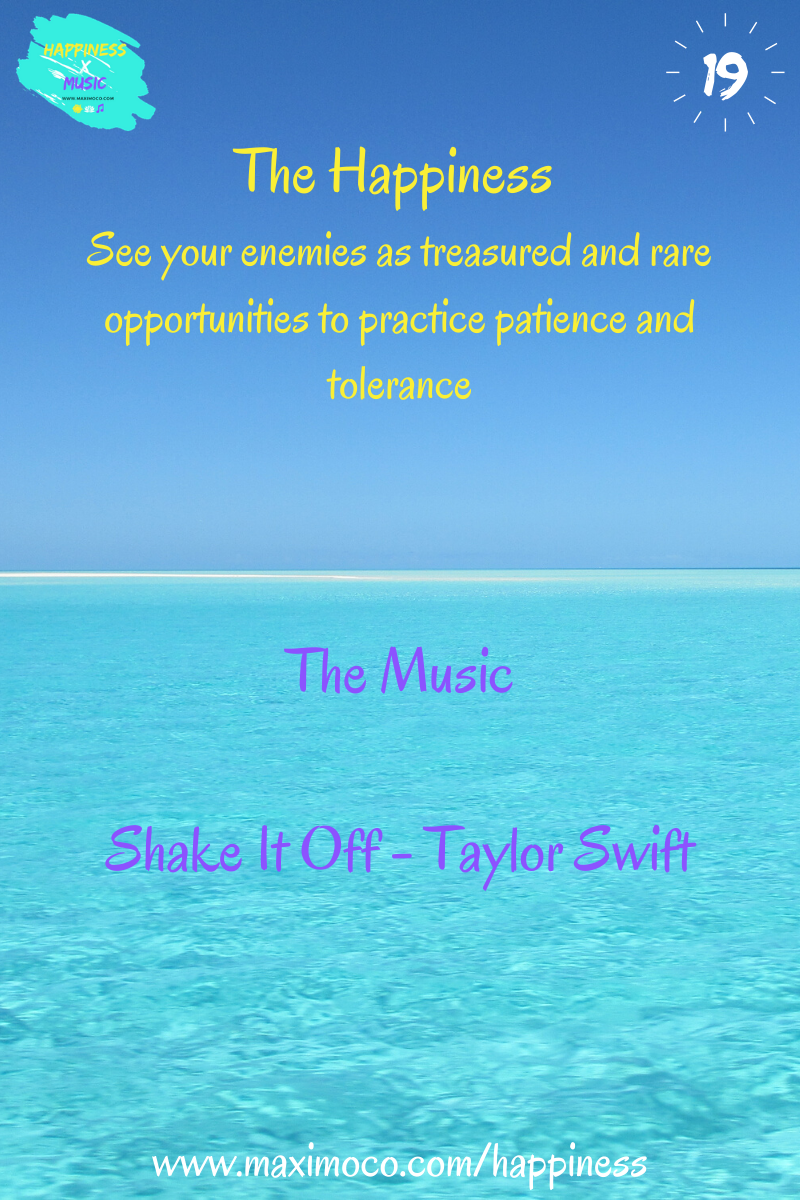

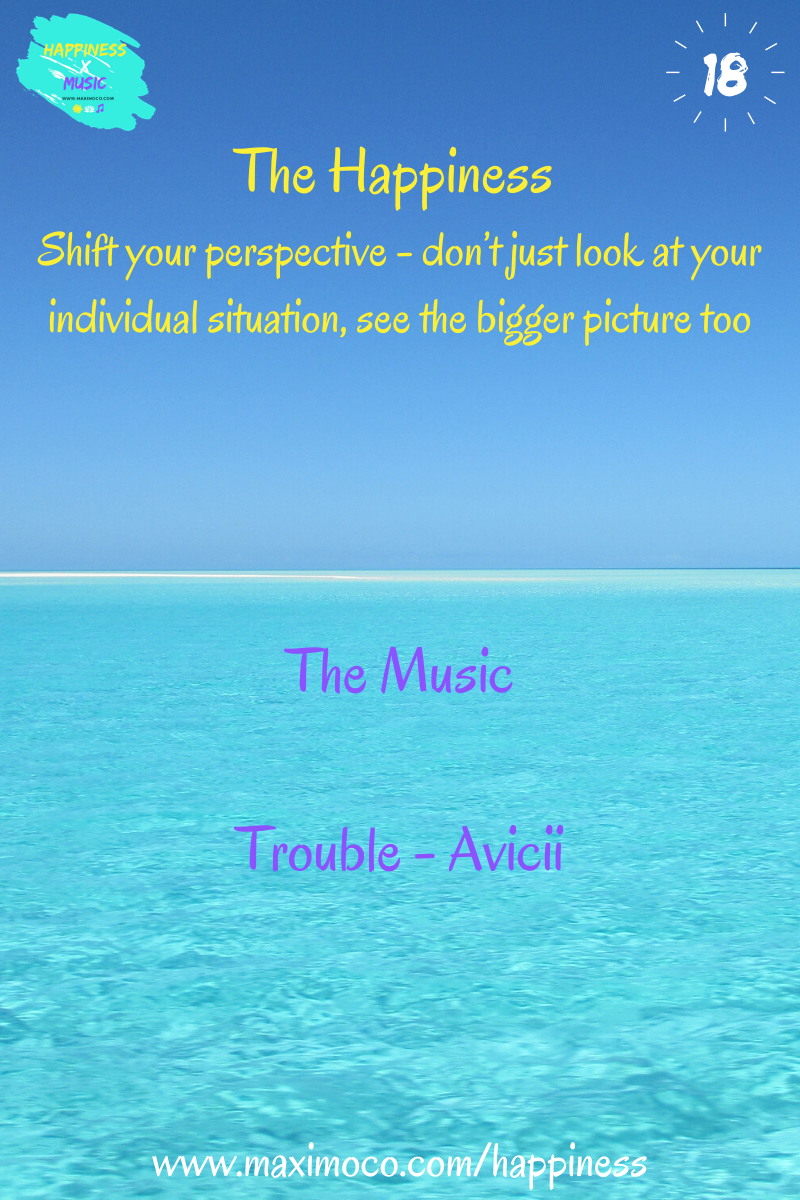

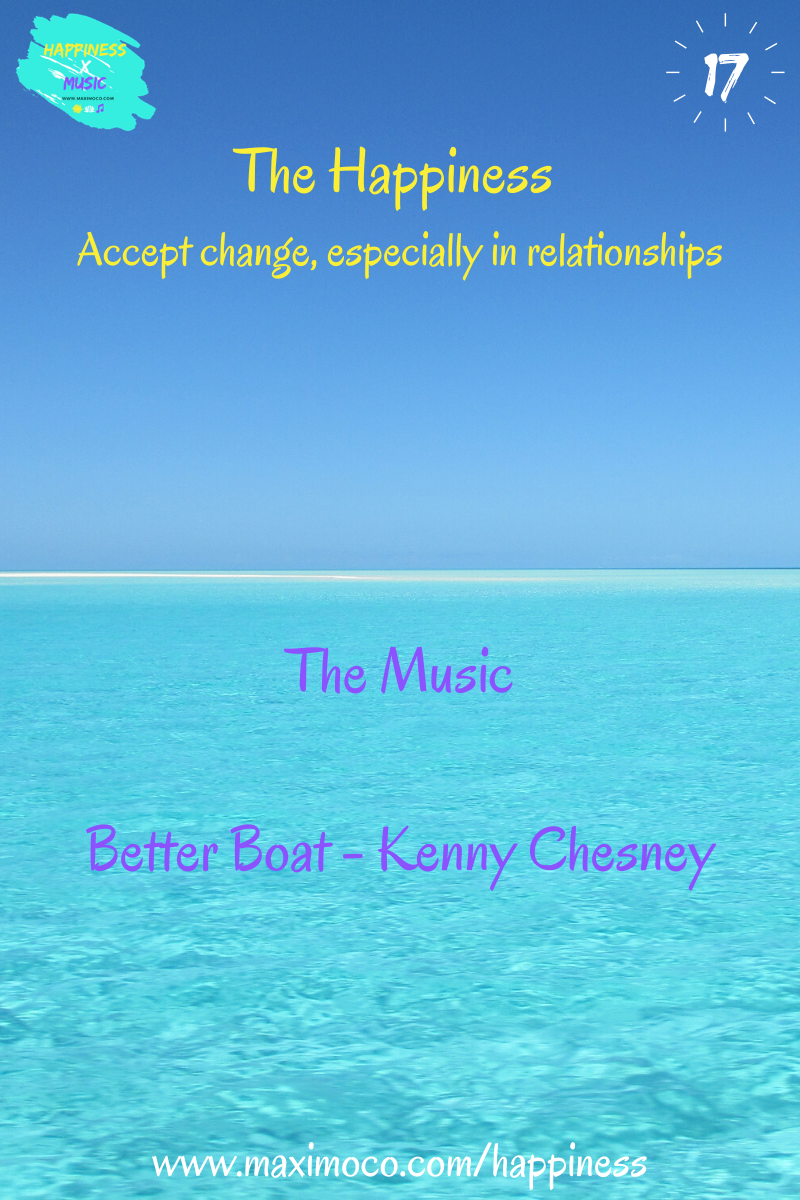
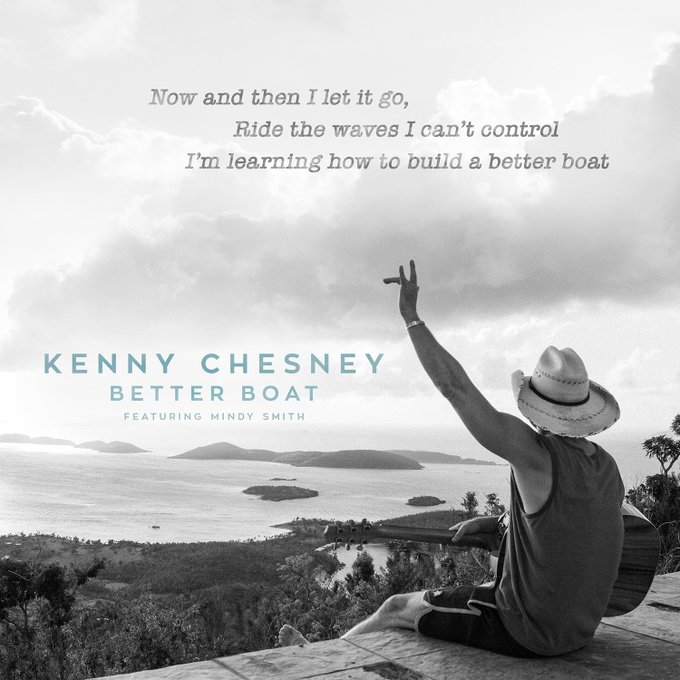
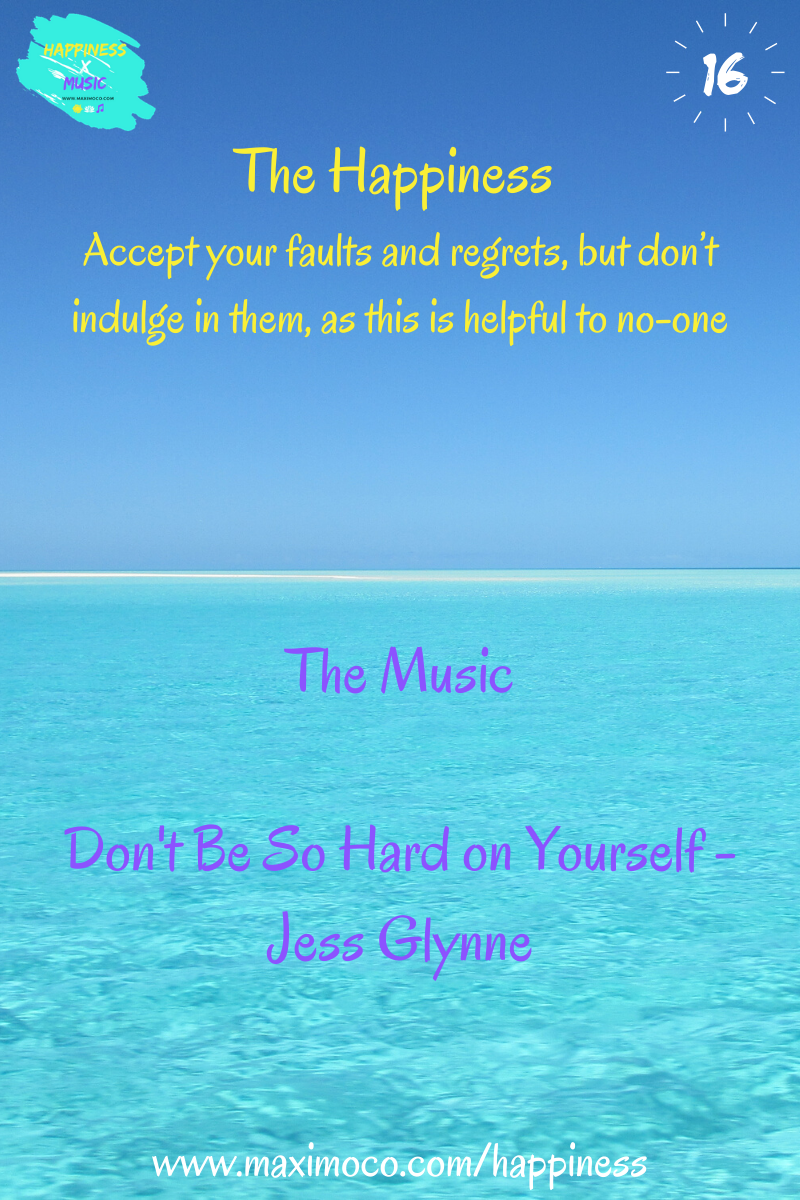

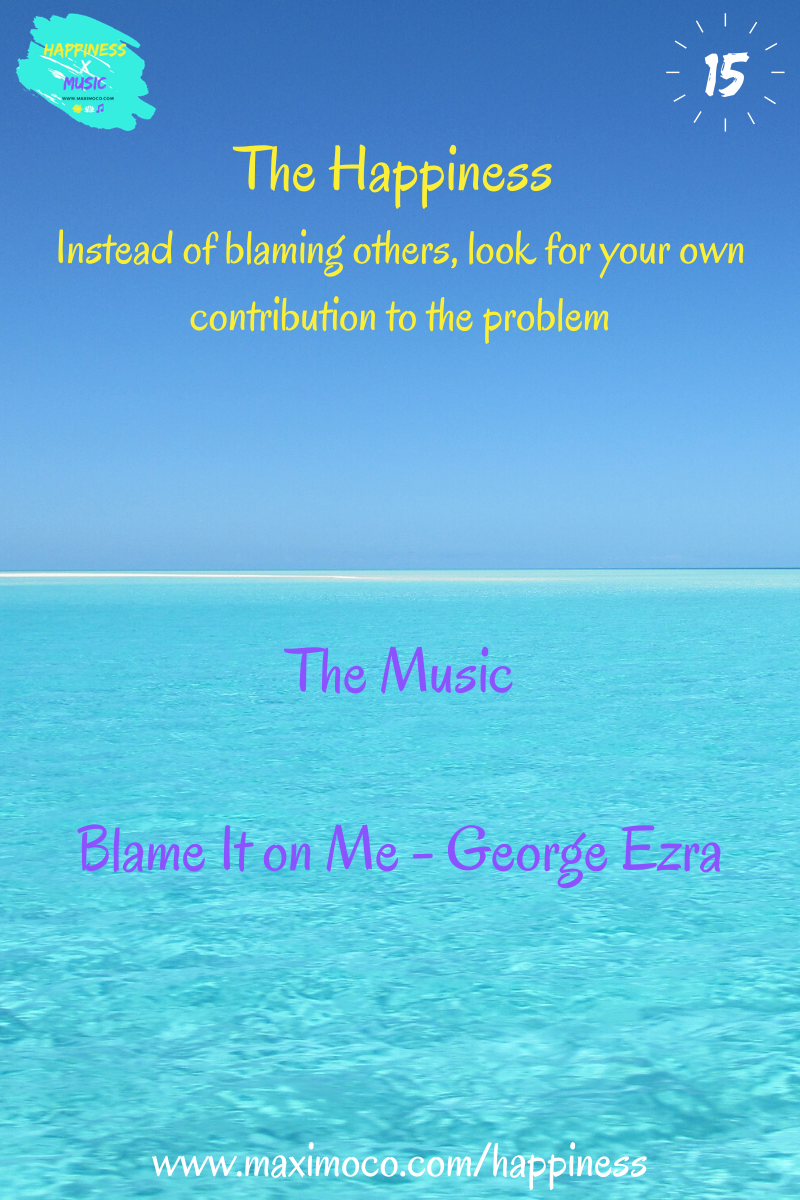
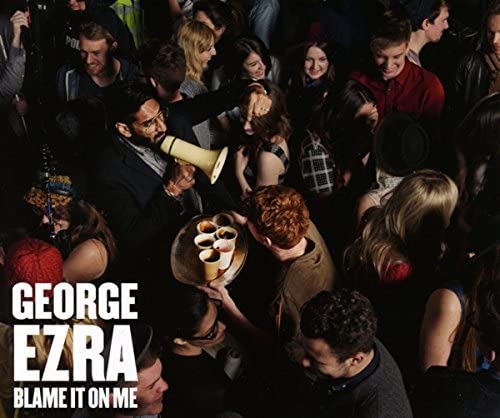

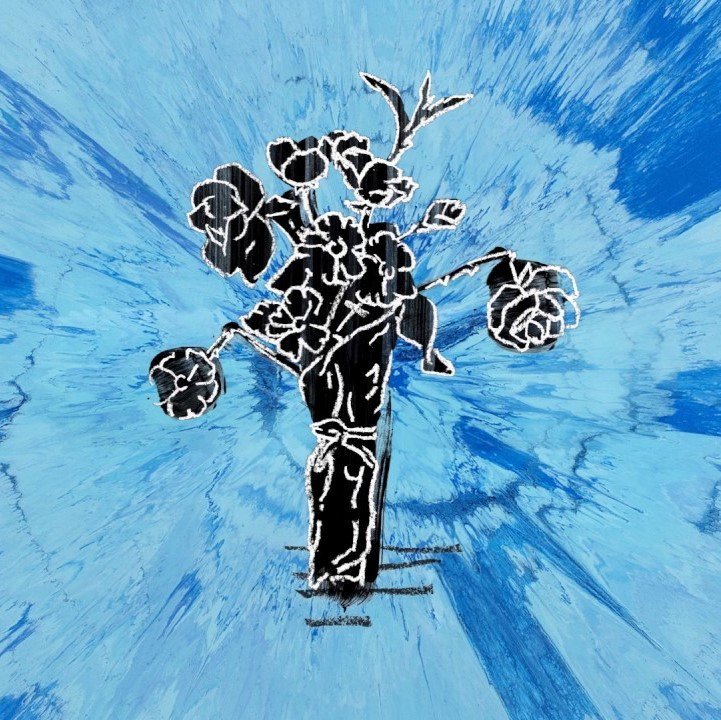
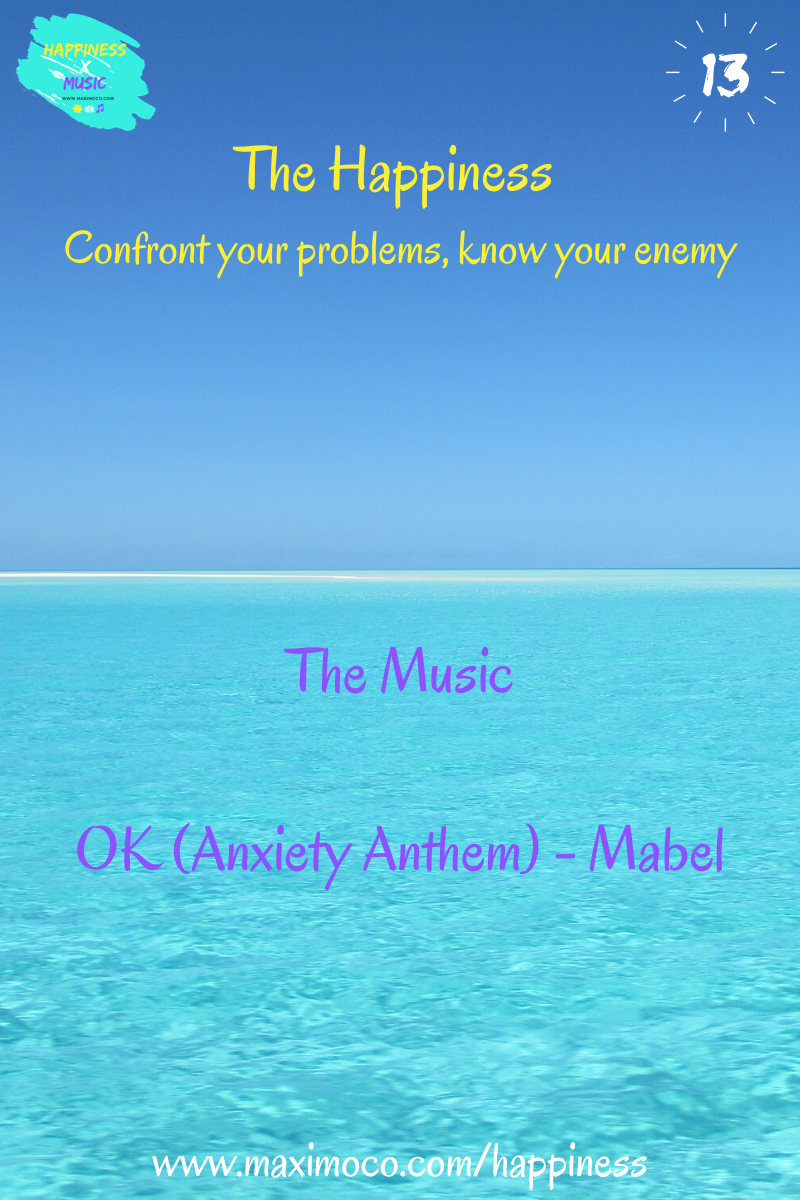


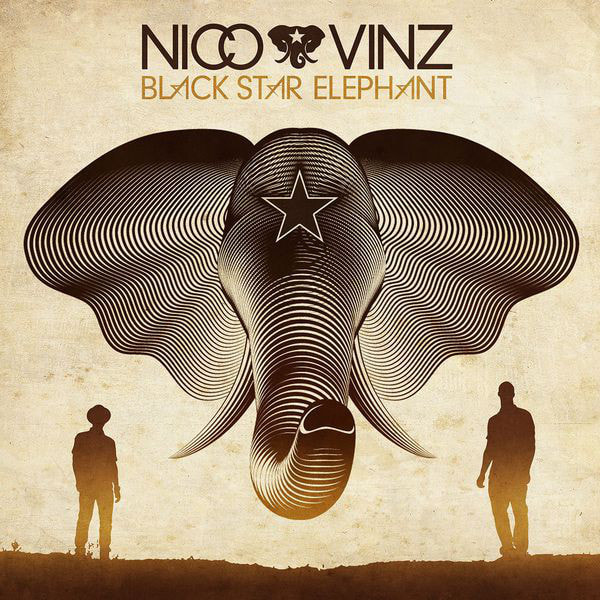
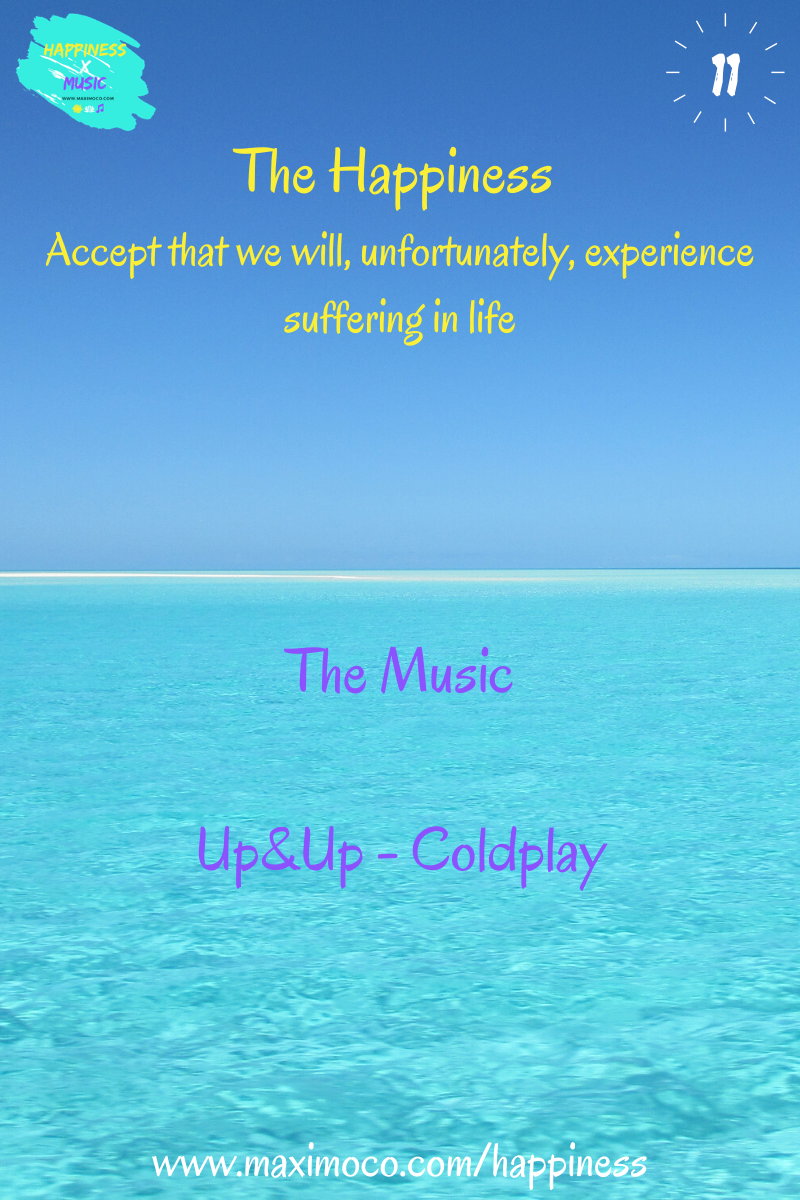


 RSS Feed
RSS Feed